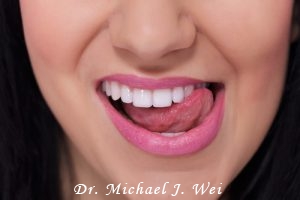Restore Your Oral Health with Gum Disease Therapy
By Dr. Michael J. Wei, DDS – Manhattan New York City Cosmetic Dentist
 Gum disease starts small but can develop into full-blown periodontitis if the condition is not addressed. Gum disease therapy is necessary to correct the pain, bleeding, loose teeth, and other signs associated with gum disease. The problem will never heal itself. Treatment of periodontal disease by New York City cosmetic dentist Dr. Michael J. Wei ensures that your oral health will be renewed and ready for any cosmetic or restorative dentistry procedures to complete your smile makeover.
Gum disease starts small but can develop into full-blown periodontitis if the condition is not addressed. Gum disease therapy is necessary to correct the pain, bleeding, loose teeth, and other signs associated with gum disease. The problem will never heal itself. Treatment of periodontal disease by New York City cosmetic dentist Dr. Michael J. Wei ensures that your oral health will be renewed and ready for any cosmetic or restorative dentistry procedures to complete your smile makeover.
Treatment for Gum Disease
Gingivitis may be a “small” threat to oral health but, when permitted to progress, gum disease becomes a serious illness. Addressing the problem immediately and aggressively is necessary to help prevent tooth loss and avoid compromising your entire oral health.
For most patients, periodontal therapy involves removing the decay and calculus – the hardened plaque – from below the gum line using a technique called scaling. The next step is to smooth teeth roots in a procedure known as root planing, an effort that reduces rough areas that are prone to plaque and tartar buildup. The pockets around the teeth must be irrigated properly with a major deep clean, and thoroughly cleansed and healed before it’s possible to begin rebuilding your smile.
Not all gum disease responds thoroughly enough, however, to scaling treatment and root planing. Along the way, it may be necessary to employ topical antibiotics, like Arestin and Atridox, and administer these local antibiotic injections directly to the gums. Painless, odorless options, these antibiotics eliminate chronic bacteria around the gum and kill infections.
The Connection Between Gum Disease and Overall Health
No matter your DNA or dental habits, everyone is at risk for developing gum disease. Even if you brush and floss diligently, in some situations, dental hygiene is not enough to counteract gum disease.
While plaque is the top cause of gum disease, other factors can increase your susceptibility where this oral health problem is concerned, such as:
- Genetics. If your parents or grandparents suffered from gum disease, you have a higher risk of developing periodontitis.
- Bad habits. One of the biggest bad habits – whether done consciously or subconsciously – that can lead to gum disease include neglecting your dental hygiene, smoking, or taking certain medications that don’t produce enough saliva in the mouth.
- Medication. Gum disease develops in mouths that are unhealthy, dry, or overheated. If you are on any sort of medication, ask whether the pills combat dry mouth or cause it. Your mouth needs to produce enough of the right kinds of saliva to keep teeth and gums moist and free of bacteria.
- Pregnancy, menstruation, or menopause. Women who are dealing with hormonal fluctuations may very well notice that their gums are in poor shape. This situation could be temporary, as in the case of pregnancy gingivitis, a condition that causes an expectant mother develop gum inflammation.
Gum disease left unattended will destroy the bone supporting your teeth while also damaging the soft tissue around your teeth. Your teeth and gums will separate from each other, creating pockets that get filled with bacteria and develop infection.
Symptoms of Gum Disease
The early symptoms of gum disease are easy to overlook. If you’re visiting your Midtown Manhattan dentist every six months as recommended, he will notice when something isn’t right with your gum health, and if there have been any major oral health changes since your last appointment. Skipping dental exams and cleanings, however, increases your chances of developing a big problem. If you are experiencing any of the following symptoms, they could indicate that gum disease is present, or they could point to another oral health problem. In either case, you should see your New York City dentist for a check-up:
- Bleeding gums
- Red gums
- Tender gums
- Receding gums
- Swollen gums
- Loose teeth
- Bad breath
- Pain
To make an accurate diagnosis, your dentist will take note of the color of your gums, whether bleeding occurs, gum firmness, tartar build-up, tooth sensitivity, and of course whether there are pockets between the teeth and gums and whether teeth move. X-rays can also revel infection below the gum line.
Do You Need Gum Disease Treatment in Midtown Manhattan?
Gum disease will not go away by itself. This oral health problem not only compromises the appearance and functionality of your teeth and gums, it can affect your overall health and wellness. Because gum disease is an inflammatory condition, a connection is often drawn between cardiovascular health and periodontitis.
The gum disease treatment provided in our dental office may include some Electrosurge procedures in the office. However, if gum disease has advanced to needing surgery, you will be referred to a trusted colleague for specialized care. It is recommended that recovering periodontal disease patients visit a dentist every few months for evaluation. After successful gum disease therapy, we make sure you understand how to ward off any recurrence, and learn about your options for restorative dentistry.
If you suspect gum disease in early or late stages, schedule a consultation with Dr. Michael J. Wei. A restorative and cosmetic dentist in Midtown Manhattan, Dr. Wei has seen the worst and created the best – if you’re ready to get healthy and improve your smile, contact us to schedule your appointment.
